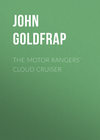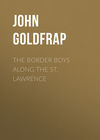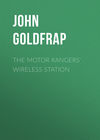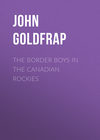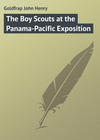Читать книгу: «The Motor Rangers' Cloud Cruiser», страница 4
CHAPTER X.
“DING-DONG” AND A GUN
All this time Ding-dong Bell had been making history in a fashion all his own. The lad had been below, pottering about his beloved engines, at the time that the others had gone aboard the schooner, and consequently was quite unaware of what had occurred till he emerged on deck and found that the Motor Rangers’ craft was deserted.
“Guess they’ve gone aboard the schooner,” thought the lad, and was preparing to follow, when a sailor, stationed at the latter vessel’s main shrouds, to which the Motor Rangers’ boat was made fast, stopped him.
“Stay where you are, young feller,” he ordered crisply.
It was at this moment that Ding-dong’s sharp eyes noticed a little group, consisting of the captain, the mate, and several of the sailors, standing aft by the cabin companionway.
“I want to join my friends,” exclaimed Ding-dong, forgetting to stutter in his righteous indignation at the fellow’s tone and manner.
“Guess your friends ain’t receiving company, except by permission of Captain Lawless,” was the reply given, with an impudent grin.
As the man spoke, he made a motion as if to grab Ding-dong, who was standing with one leg on board the Nomad and the other on the schooner’s bulwarks.
But Ding-dong was quite as quick in his actions as were his two chums. Moreover, he was a muscular lad, and his thews and sinews had been toughened to a steel-like fineness by his many adventures.
Consequently, as the sailor rushed at him, the lad merely caught the man’s outstretched arm, and, by a trick that he had learned from Nat, gave it a sudden twist.
“Ouch!” grunted the fellow, and, without making any more fuss, he writhed almost double and fell in a heap. But as he did so, Captain Lawless spied what was going forward. In the haste with which the plans to capture the Motor Rangers and their friends had been made, the fact of Ding-dong Bell’s existence had been temporarily forgotten by the rascally skipper and his mate. This sudden appearance, then, of one of the Motor Rangers, alive and intensely active, was very disconcerting to them.
“Confound you, boy; where did you spring from?” roared Lawless, as he dashed at Ding-dong like an angry bull.
“Fer-fer-f-from under a go-go-gooseberry bush,” sputtered Ding-dong, giving an agile backward jump, which brought him upon the deck of the Motor Rangers’ vessel.
At the same instant came a thunderous sound from the cabin door beneath, which, as we know, the imprisoned party were pounding and rapping.
The sound told Ding-dong the whole story as plainly as if it had been put into words.
“What have you done with my friends?” he demanded.
“Never you mind. Just throw up your hands and come on board this schooner or it will be the worse for you.”
“No, thank you,” parried Ding-dong, his speech quite distinct in his indignation and excitement, “I guess I know when I’m well off.”
“You brat, I don’t propose to be thwarted by such a whipper-snapper as you. Come on board at once, I say!”
“Not to-day, thank you. Call around to-morrow,” scoffed Ding-dong.
As he spoke, the lad rapidly made his way forward over the turtle back of the Nomad.
A sudden idea had come to him. On this turtle back was situated the rapid-firing gun which was a part of the craft’s equipment. Joe had been polishing it that morning, the cover was off and it looked ready for instant action.
With cat-like activity and swiftness, Ding-dong made for the implement of destruction. Reaching it, he took his stand on the small platform on which it stood.
Before the astonished Captain Lawless could scramble after the lad, Ding-dong had swung the gun on its swivel, and the captain found himself gazing straight into its formidable looking muzzle.
Ding-dong had his hand on the firing lever, and the rascally skipper went white as ashes as for an instant he thought the lad was going to discharge it.
“Don’t! Don’t shoot!” he begged abjectly.
“Then you get right back where you belong,” ordered Ding-dong.
Just then he noticed that several of the crew of the schooner were about to follow their captain on board.
“You fellows, too,” ordered the boy in a sharp, shrill voice, which nevertheless rang with determination.
“I’m ver-ver-very nervous,” he went on, “and at any mum-mum-moment I’m likely to give this lever a twist.”
“I’ll get even with you for this, my hearty,” muttered the nonplussed Captain Lawless, but nevertheless he scrambled back after his crew as Ding-dong gave his crisp command.
“Now, then,” cried the boy in a determined tone, “you let my friends out of that cabin, or I’ll have to indulge in some target practice with your schooner as the bull’s-eye.”
“Not much you won’t!” roared out Durkee, the mate.
As he spoke, the fellow whipped out a pistol and aimed it at Ding-dong.
The lad depressed the breech of the gun and gave the lever a twist. Instantly a sputter of bullets flew forth. They lodged in the schooner’s spars and rigging, sending a shower of splinters all about.
At the same instant, the roar of the blunderbuss sounded from the cabin, and a fat sailor, who had been sitting on the door, bounded into the air. He was not hurt, but imagined that a mine had exploded beneath him.
As the adventurers rushed out of the cabin, they came face to face with a scene in which Ding-dong Bell was the dominating factor. The moral effect of the machine gun’s discharge had been tremendous. Palefaced and demoralized, Captain Lawless and his crew fled forward, where they huddled in a mass like so many frightened sheep.
“Say, professor!” hailed Lawless, “call that young gad-fly off. He’s done a hundred dollars’ worth of harm to my ship already. Call him off, do you hear?”
“It would serve you right if your schooner was sunk,” retorted the professor. “What did you mean by imprisoning us in that cabin?”
“It was just a joke,” pleaded Lawless, whose face was pallid. He paid no attention to the promptings of his mate, who was urging him, in an undertone, to “stand up to the lubbers.”
“We’ll give in, professor,” he went on in a shaky tone. “You’re welcome to take all your baggage and go, without us making any more trouble.
“How can we depend on you?” asked the professor.
“I’ll give you my word,” said the captain.
“A whole lot of dependence we could place on that,” scoffed Mr. Tubbs.
“Tell you what,” spoke Nat; “let’s make him lock all his sailors up in the forecastle. We can guard them, and then, in case of treachery, we’ll only have two to deal with.”
The professor delivered this ultimatum. Captain Lawless readily agreed to comply with it. The crew, sullen and muttering, was ordered below, and the forecastle hatch battened down. Joe was set to guard it, while the others helped in the work of transporting the baggage on board the Motor Rangers’ craft.
Of course Ding-dong Bell, who had really displayed the qualities of a capable general, came in for much warm congratulation. He took his honors modestly.
“I dud-dud-didn’t know it was lur-lur-loaded,” he protested, and, as a matter of fact, the lad had been as much astonished as any one at the tremendous fusillade that followed his manipulation of the machine-gun’s firing lever.
At length all the baggage was on board. During its transportation, Captain Lawless and his mate had looked sullenly on, but offered no aid or interference. They were beaten men, and they knew it. Once the professor’s report of their conduct was circulated, there was not a civilized port into which they could take the schooner without being arrested and brought to book for their misdeeds.
But they watched the Motor Rangers board their own craft and cast off the lines without show of any emotion on their stolid countenances.
“You can release your crew now,” said Nat, when Joe had clambered on board. As he spoke he rang the bell for the “Go ahead.”
The Nomad began to forge through the water. By the time Captain Lawless had reassembled his crew, the schooner was not more than a speck to those on the Nomad.
“Well, that was a queer adventure,” said Nat, as they talked it over that evening. “What a foolish man that skipper was to ruin his career for the sake of spite!”
“Yes, he will be a marked man now,” spoke the professor. “In these days of wireless telegraphy and other improved means of communication, there is not a spot in the Seven Seas where he can hide his head without being overtaken by the consequences of his folly and cowardice. I think he was led into this thing by that mate of his, Durkee. He is a very bad man.”
“Well, I guess they won’t bother us any more,” struck in Joe; “in fact, my thoughts from now on are centered on the lost city and that cloud cruiser of yours, professor.”
The professor smiled at the youth’s enthusiasm. Then Mr. Tubbs spoke.
“I reckon you folks have forgotten something,” he said. “That chap Lawless has overhauled the professor’s papers. Don’t you think it’s likely he may try to locate the lost city, too? It’s a stake worth playing for.”
“Wow!” exclaimed Joe. “If that’s the case, look out for squalls.”
CHAPTER XI.
CAPTAIN LAWLESS TRIES TRICKERY
“Do you intend to let them get away from us like this?”
It was Mate Durkee, of the Tropic Bird, who asked the question of Captain Lawless, as the two stood leaning on the schooner’s rail, watching the fast-diminishing form of the Motor Rangers’ capable craft.
The wind had fallen, and the schooner was dipping and rolling on the swells, with her canvas flapping idly. The crew, grouped in a mass forward, were watching their superior officers with some curiosity. Plainly they were anxious to see how the situation was to be met.
“Well, what are we going to do about it?” demanded Lawless.
“I’ve got a plan, but it involves a good deal of risk,” was the reply. “Are you willing to take a chance?”
“I’m willing to do almost anything to get even on that outfit,” was the response, in a vicious tone.
“Then listen to me. I happen to know that we are not far from an island where I’m pretty sure we can sell the schooner to the old chief for a good price. When that is done, we can get a canoe from him and have some of his men paddle us out into the track of that line of Dutch steamers that run from Manila to Callao. If we spin a good enough yarn, we can get passage all right.”
“Well, what then?” grunted Captain Lawless.
“Why, can’t you see? We’ll get from Callao to that Chilean port for which that outfit is bound in very little time. Once there, we can use our own judgment as to how to proceed. But I must admit, that I, for one, mean to get a chance at the treasures of the lost city.”
“Suppose we did make that island you are talking of,” said Captain Lawless, in tones that showed that the mate’s plan had made a deep impression on him, “how soon would that Dutch steamer be going by?”
Mate Durkee made a rapid mental calculation.
“I used to run on the line, so I know their schedule pretty well,” he said. “She should be going by by to-morrow night, at latest.”
“Humph! But you don’t seem to have taken the crew into consideration. What are we going to do with them?”
“Oh, give them some sort of song and dance and abandon them. They can live very well on the island till some vessel takes them off.”
This cold-blooded proposal seemed to banish Captain Lawless’ last lingering trace of hesitation.
“It’s a good plan,” he said, “but a daring one. Suppose it ever leaks out how we sold the schooner? There’ll be a clear case of barratry against us.”
“So far as that is concerned,” urged Durkee, “we can’t be much worse off than we are now, can we? That professor means to make things hot for us in the States. I saw that in his eye. We must take refuge somewhere, and Chile looks about as good to me as any place I can think of right now.”
“I don’t know but what you’re right,” agreed Lawless. “Let’s go below and look at the chart. How long ought it to be before we reach this island, if we get a good breeze?”
“Not more than eight hours. If the wind picks up, we should make a landfall before midnight.”
Some two hours later a spanking breeze arose out of the northwest. The schooner’s sails bellied to it, and a spirit of joy was abroad among the crew. Their officers had promised them a quick run to a fine island, and then unlimited shore leave. Little dreaming of the trap that was being laid for them, the crew went about their tasks of trimming sails with songs and glad shouts.
When twilight fell the schooner was bowling along at a twelve-knot gait, bound for the island of which Mate Durkee had spoken. It was known to him as Brigantine Island, although the charts called it Cook’s Land.
As the mate had foretold, it was not long after midnight when a cry of “Land ho!” rang out from the forward lookout. It was bright moonlight, and in the silvery radiance those on board the schooner had no difficulty in making out a long, low elbow of land right ahead. Close at hand they could hear the thunder of the surf as it broke on the reef.
“Do you know the passage?” asked the skipper of his mate.
“I could run it blindfold,” was the response. “Close haul on those head-sheets!” he called out. “Lively, now! Bring her about! That’s the way! Here, I’ll take the wheel myself!” he cried the next instant, springing to the helm.
Under his skillful guidance, for there was no denying that the rascal was an able seaman, the Tropic Bird was swung through the narrow passage-way in the reef, and shot into the calm waters of the lagoon beyond.
“Don’t seem to be much life ashore,” said Captain Lawless, scanning the moonlit island.
“Fire a rocket, and you’ll see the dingoes come running out of their holes,” laughed the mate.
A big signal rocket was procured from the ship’s stores, and discharged.
As it burst in a cloud of blue flame, and the “bang” which accompanied its bursting resounded loudly, lights began to flash on shore, and they could see scores of dark figures scuttling about the white beach.
“What did I tell you?” said the mate, with a grin. “We’ll get a great reception, all right.”
“They don’t happen to be cannibals, do they?” inquired Captain Lawless timidly, his habitual caution asserting itself.
The mate laughed.
“What a one you are to get scared, Lawless!” he said. “Your name don’t fit you a bit. Cannibals, is it? I should say not. Those chaps are mission natives – some of them – and as smart a bunch as you’d want to see.”
As there was no time to be lost, if they wished to carry out their audacious plan, the captain ordered a boat lowered and he and his mate went ashore immediately. The chief was soon found. In fact, he was down on the beach. He recognized Durkee, who seemed to have some sort of a hold over him, and negotiations for the sale of the schooner were at once begun. Like most dealings with savage folk, it required a lot of diplomacy to accomplish the desired end. The trading was carried on under a palm-thatched roof, while natives with torches stood all about.
If the two white men had not been so engrossed with their own affairs, they might have been inclined to admire the savage picturesqueness of the scene. But, as it was, they devoted their attention strictly to business.
The chief, who rejoiced in the name of Billy Bowlegs – an appellation of which he seemed quite proud – proved an adroit old bargainer. He spoke English well, and was to the full as shrewd as any Caucasian trader.
But at last they managed to “make a deal,” as the saying is. Billy Bowlegs was in need of a good schooner, and had long coveted the Tropic Bird, which was well known in those waters before Captain Lawless acquired her. The chief was willing to give three hundred dollars in cash and two valuable pearls, worth fully the same amount each, for the craft.
As this was the best they could do, the two rascally white men agreed on this figure, and Billy Bowlegs agreed to give them transportation in a war canoe as far as the path of the Dutch liners, which passed to seaward of the island by fifty miles or so.
The crew, carousing and enjoying themselves in their own rough fashion, knew nothing of the departure of their captain and mate that morning, nor did those two worthies wish that they should. By the time the abandoned men awoke to the true state of affairs, Lawless and Durkee were on board the Dutch steamer Prinz Joachim of the Imperial Peru and Manila Line, bound for Callao. They were regarded with much interest on board the craft as two luckless mariners – rough but honest – who had lost their vessel in the great magnetic storm.
And so, while the Motor Rangers were gleefully heading for the land of the lost city, their two malignant foes were likewise speeding toward South America on a fast, well-equipped vessel.
CHAPTER XII.
“GOOD WORK, MANUELLO!”
“Any sign of land yet, Nat?”
The professor put the question, as he stood beside the young leader of the Motor Rangers on the bridge of the Nomad.
“I’ve noticed a sort of purplish mass, like a low-lying reach of clouds, in the distance for some time,” was the rejoinder. “Do you think that it can be the coast of Chile?”
“I think it is highly probable; we should be picking up the land by this time. I think – heaven bless us!”
The professor clutched wildly at his head. But he was too late. His latest “top-piece,” a cap that had belonged to Ding-dong Bell, was whirled from his head into the sea.
“It’s an extraordinary thing,” he said with a kind of patient resignation. “But I don’t seem able to keep a hat on my head at all.”
“So I’ve noticed,” rejoined Nat, with a sort of dry humor, “and that’s the last spare one on board. You’ve had six since we left the volcanic islands, and there are no others left.”
“Well, I suppose I must go bareheaded, then, till we reach land. It is most annoying, though, really. I cannot account for it.”
Nat had a hard task to keep from laughing, but he managed to maintain a straight face by dint of heroic resolution. Moreover, as the bridge was protected by awnings of red and white striped material, he did not fear that the man of science would suffer greatly from the sun.
It speedily became evident that what Nat had seen was indeed the coast of Chile. By late afternoon they could make out the great mountain masses which hang above the rather low lying coast.
“Gives one a kind of a thrill to think that if all goes well we’ll be flying over those before long,” remarked Joe Hartley, as they all stood grouped on the bridge, watching the distant land with interest.
“It certainly does,” agreed Nat.
It was three weeks since they had parted company with the schooner, and the Nomad had been somewhat delayed by bad weather. But, all things considered, she had made a good run and all on board were in high good humor as they foresaw the end of the voyage.
By nightfall they were entering a landlocked bay that forms the harbor of Santa Rosa. It seemed to be a tiny place, as well as they could judge. Above the huddle of houses there rose the inevitable twin towers of the cathedral, however, and through the glasses they could make out, with a thrill, that Old Glory was flying over one of the buildings, no doubt the American consulate.
“I tell you, that old flag never looks so good as when you see it flying in a foreign port,” observed Mr. Tubbs, a sentiment which they all echoed.
As soon as they had anchored, their craft was surrounded by a fleet of boats from the shore. It was dark, and in the blackness the tiny lights carried by the swarming craft made them resemble a fleet of fire-flies, as Nat poetically remarked.
“I am going to take a boat ashore,” said Professor Grigg, as soon as everything had been made snug. “As we wish to start on the expedition as soon as possible it is important that I should see Mr. Stowe, the American consular agent, without delay. I am anxious, too, to know if the sections of the dirigible arrived in good shape.”
“By the way, professor,” asked Nat, “what is the airship’s name?”
“Why, bless my soul, I hadn’t thought of that,” remarked the man of science, “she ought to have one, too. What would you suggest?”
“I think Discoverer would be a good name,” said Joe.
“Dd-d-d-dish coverer?” inquired Ding-dong mildly.
In the scuffle that ensued, the lively young engineer of the Nomad was almost toppled overboard.
When quiet was restored, the professor said that he thought that Discoverer was a very good name. And so it was decided upon.
“You may come ashore with me, if you like,” said the professor to Nat.
“If I like,” echoed that lad; “of course I’d be delighted to,” he added.
Accordingly, a few minutes later they set out in one of the shore boats for the city, leaving behind them two youths with rather long faces. Ding-dong and Joe would have dearly loved to share in the expedition, but their presence on board was necessary, as the Nomad, after her long, rough cruise, was badly in need of a “general housecleaning.”
“I guess the consul will be astonished when he learns of the manner in which I have traveled here,” remarked the professor; “naturally he was expecting me on the schooner.”
“Speaking of the schooner,” said Nat as the native rowers propelled the long, narrow boat swiftly through the water, “you don’t anticipate any trouble from Lawless or Durkee?”
“No, I do not,” was the rejoinder; “in the first place, the schooner could not arrive here for many days, even if they had made up their minds to follow us. By that time we shall be, I hope, far advanced into the upper regions of Chile.”
As the professor spoke one of the boatmen gave a shout. Nat looked up and saw that a sailboat was bearing right down on them at tremendous speed. The outlines of two men could be seen, but it was too dark to distinguish their features.
“Good gracious, if that man doesn’t tack he’ll run us down!” cried the professor.
“He will indeed,” exclaimed Nat. “Hi there! Look out where you’re coming!” he yelled, adding his voice to the outcries of the boatmen.
But the occupants of the sailing craft paid no attention. At a terrific speed the larger craft bore straight down on the little boat.
The boatmen stood paralyzed with fear. They did nothing. Suddenly one of them dropped on his knees, and began imploring the protection of the saints.
Nat sprang toward him, almost upsetting the frail boat as he did so. With a quick movement he seized one of the paddle-like oars, and by exerting all his strength as he thrust it into the water, he managed to send the boat spinning out of harm’s way.
The next instant the sailing craft flashed by, almost grazing the bow of the small craft.
“You’re a nice pair of irresponsible idiots,” yelled the indignant Nat. “Do you know you almost ran us down?”
A yell of derision came from the other boat, and at the same instant something heavy whizzed past Nat’s head, almost striking him. It fell in to the water with a splash.
“They threw something at me, an iron weight, or a rock, or something,” exclaimed Nat as the sailboat, still going at the same rapid rate, vanished in the darkness. “What do you make of such conduct?”
“I don’t know what to think,” rejoined the professor. “I was inclined to believe at first that the sailors of that craft were merely careless. But the throwing of that weight puts a different complexion on the matter. It looks as if they deliberately tried to wreck us.”
“It does,” agreed Nat; “the whole thing is very mysterious. I’m sure I don’t know why any inhabitant of Santa Rosa should wish us harm.”
But further discussion of the matter was cut short by the necessity of arousing the boatmen, who were still stupid from fright. This was accomplished at last, and the boat was sent whizzing through the water again.
They were landed at a tumble-down wharf, and as the tide was out they got the full benefit of the odors inseparable from a South American town. Both, however, were too intent on the work in hand to waste much thought on this.
The professor, who spoke Spanish, as did Nat after a fashion, inquired the way to the consulate, and a ragged mestizo volunteered to escort him thither. But to their disappointment, when they reached the building, which served both as a dwelling and an office, the consul’s assistant informed them that he was not expected for an hour or more. They were invited to wait, however.
Professor Grigg, who was tired, gladly accepted the invitation, and sank into a comfortable chair. But sitting still didn’t much appeal to Nat.
“I guess I’ll stroll about the town a little and meet you here later,” he said to the professor after a few moments.
“Very well, my lad. But be careful,” was the reply.
“Oh, I’ll be very cautious,” laughed Nat; “at any rate, I can’t get run down by a boat ashore here.”
“But there may be dangers, nevertheless,” counseled the professor.
Nat again promised to be careful and hurried out. He wished to mail some letters home, as well as do a bit of sight seeing. He found the post office without difficulty and, having mailed his missives, was leaving it, when a native, in a long serape, or cloak, glided up to him.
“The señor is from the boat which anchored this evening?” he asked.
“Yes,” rejoined Nat. “Why?”
“Because if the señor wishes to see the town I am very good guide. I can show him where they sell veree fine ’Merican ice cream soda.”
“By ginger! You’re on,” cried Nat, who had a weakness for ice cream sodas; “lead on, Macduff. You don’t look very presentable, but I guess that isn’t your fault.”
“Thees way, señor,” said the man, and he walked off slightly in advance of Nat.
Suddenly he turned into a dark alley. Now, although Nat had nothing to dread, yet he began to be fearful that the fellow might mean to rob him. So he stopped short for an instant. But the next moment his suspicions were disarmed by a look at the ragged, pitiable fellow. Nat would have been a match for six of him.
“Where are you going?” he demanded, however, as they plunged into the narrow thoroughfare, which was ill-paved and black as a tunnel.
“A short cut, señor. A short cut to the Gran’ Plaza. We be there soon now.”
“Well, let’s hurry up and get out of this, quick,” said Nat; “I don’t much like – ”
Smash!
Something struck the young Motor Ranger on the back of the head. He extended his arms helplessly, and plunged dizzily forward, collapsing in a heap on the pavement.
At the same instant two figures glided from a doorway and joined a third, the one who had struck Nat the blow that felled him.
“Good work, Manuello,” said the voice of Captain Lawless. “Pick him up and help us carry him in.”
Покупайте книги и получайте бонусы в Литрес, Читай-городе и Буквоеде.
Участвовать в бонусной программе
